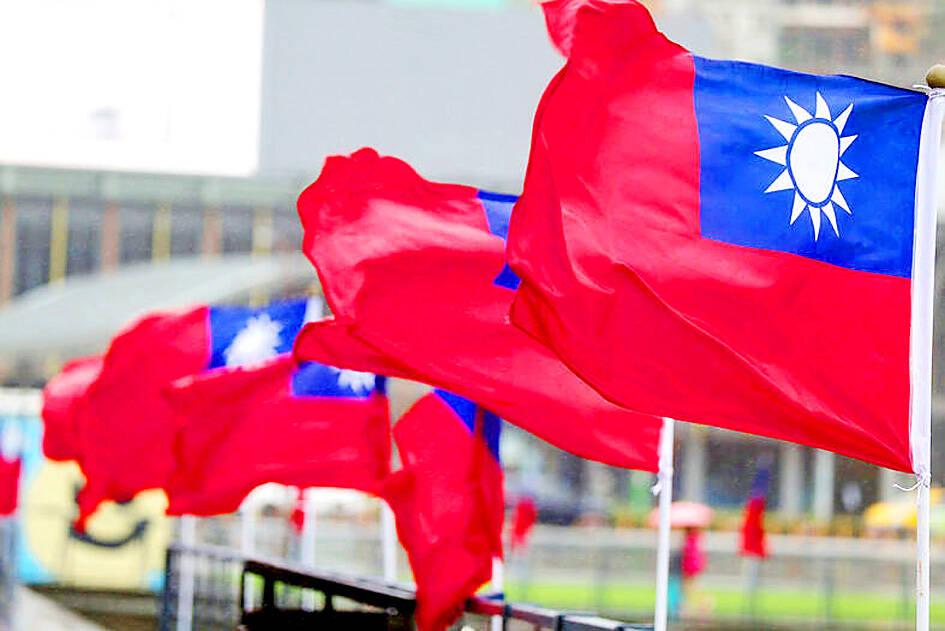The Executive Yuan is working to finalize proposed amendments relating to President William Lai’s (賴清德) 17 national security strategies, sources said on Sunday.
Lai on March 13 announced the strategies to counter growing infiltration efforts against Taiwan, from reinstating the military court system to enhancing scrutiny of immigrants from China, Hong Kong and Macau.
To fortify the legal frameworks to support the measures, the Executive Yuan has since last month convened several cross-ministerial meetings and plans to propose amendments to 11 bills, as well as 75 new initiatives and 17 government programs.

Photo: I-Hwa Cheng, Bloomberg
Among the measures and administrative orders that could be implemented immediately without needing to go through legislative procedures is a requirement that religious organizations visiting China register their information and the nature of their program with the government, sources said.
They also include requiring Chinese spouses to renounce their Chinese household registration to maintain their Taiwan residency status.
Administrative orders would also implement checks on Taiwanese entertainers working in China who denigrate the sovereignty of Taiwan or voice support for hostile military action by China. The orders would also require a comprehensive review on the status of military and civil service personnel, as well as civil servants, education sector, who are believed to have Chinese residency and a Chinese ID card.
Proposed amendments to the Criminal Code of the Armed Forces (陸海空軍刑法), the Act Governing Relations Between the People of the Taiwan Area and the Mainland Area (台灣地區與大陸地區人民關係條例) and the Military Trial Act (軍事審判法) would seek to raise penalties on military officers found to have engaged in espionage, passed on classified materials or sworn allegiance to an enemy state, the sources said.
To counter Chinese propaganda, the Ministry of Education has been working on new education materials to stress Taiwan’s national identity, and to better address China’s military intimidation of the nation, they said, adding that the texts are to be completed by the end of summer break.
The Cabinet would also introduce measures to check the backgrounds of aides and staff working at all levels of government to prevent foreign infiltration. The level of vetting would depend on the staff member’s job level or access to classified materials.
The checks would expand to include the vetting of first secretary and chief of staff ranks, as well as higher levels of ministries, the sources said.
The vetting would also include government contractors who have been in the same position for three years, as well as civil servants at the 10th level or lower rank, who would need approval from their supervisors to travel to China.

Taiwan has received more than US$70 million in royalties as of the end of last year from developing the F-16V jet as countries worldwide purchase or upgrade to this popular model, government and military officials said on Saturday. Taiwan funded the development of the F-16V jet and ended up the sole investor as other countries withdrew from the program. Now the F-16V is increasingly popular and countries must pay Taiwan a percentage in royalties when they purchase new F-16V aircraft or upgrade older F-16 models. The next five years are expected to be the peak for these royalties, with Taiwan potentially earning

POSITIVE DEVELOPMENT: Japan and the US are expected to hold in-depth discussions on Taiwan-related issues during the meeting next month, Japanese sources said The holding of a Japan-US leaders’ meeting ahead of US President Donald Trump’s visit to China is positive news for Taiwan, former Japan-Taiwan Exchange Association representative Hiroyasu Izumi said yesterday. After the Liberal Democratic Party’s landslide victory in Japan’s House of Representatives election, Japanese Prime Minister Sanae Takaichi is scheduled to visit the US next month, where she is to meet with Trump ahead of the US president’s planned visit to China from March 31 to April 2 for a meeting with Chinese President Xi Jinping (習近平). Japan and the US are expected to hold in-depth discussions on Taiwan-related issues during the

‘LIKE-MINDED PARTNER’: Tako van Popta said it would be inappropriate to delay signing the deal with Taiwan because of China, adding he would promote the issue Canadian senators have stressed Taiwan’s importance for international trade and expressed enthusiasm for ensuring the Taiwan-Canada trade cooperation framework agreement is implemented this year. Representative to Canada Harry Tseng (曾厚仁) in an interview with the Central News Agency (CNA) said he was increasingly uneasy about Ottawa’s delays in signing the agreement, especially as Ottawa has warmed toward Beijing. There are “no negotiations left. Not only [is it] initialed, we have three versions of the text ready: English, French and Mandarin,” Tseng said. “That tells you how close we are to the final signature.” Tseng said that he hoped Canadian Prime Minister Mark Carney

STAY IN YOUR LANE: As the US and Israel attack Iran, the ministry has warned China not to overstep by including Taiwanese citizens in its evacuation orders The Ministry of Foreign Affairs (MOFA) yesterday rebuked a statement by China’s embassy in Israel that it would evacuate Taiwanese holders of Chinese travel documents from Israel amid the latter’s escalating conflict with Iran. Tensions have risen across the Middle East in the wake of US and Israeli airstrikes on Iran beginning Saturday. China subsequently issued an evacuation notice for its citizens. In a news release, the Chinese embassy in Israel said holders of “Taiwan compatriot permits (台胞證)” issued to Taiwanese nationals by Chinese authorities for travel to China — could register for evacuation to Egypt. In Taipei, the ministry yesterday said Taiwan